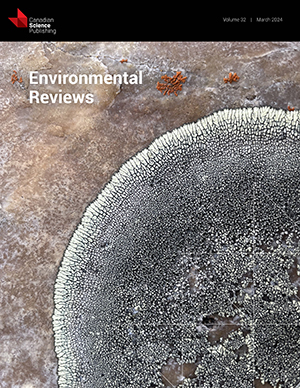Towards a Canadian National River Water Quality-Modelling System: State of Science and Future Prospects
IF 5.7
3区 环境科学与生态学
Q1 Environmental Science
引用次数: 0
Abstract
Water quality is of significant concern and ultimately critical to every Canadian’s quality of life and security. Canada has diverse and vast landscapes and stressors that impact various waterbodies differentially, with influencing factors including contaminant and nutrient loads from human activity (mining effluent, wastewater, agricultural runoff, plastics), landscape change (wetland drainage, urbanization) and climate change (warming water temperatures, longer open water seasons, extreme hydrological events, intensifying wildfires). Canadian rivers are especially important to the overall biogeochemistry, hydrology, biodiversity, and ultimate health of aquatic and terrestrial ecosystems. While each of Canada’s provinces and territories has extensive river water quality (physical, chemical, biotic) data and monitoring programs, Environment and Climate Change Canada coordinates various national programs that contribute to the collection and consolidation of these data and conducts extensive research into the study and modelling of key river water quality processes. Despite program-specific efforts, there remains poor capacity to predict current and future conditions in monitored and unmonitored Canadian rivers, particularly remote or northern rivers, due to a myriad of factors including lack of coordination amongst groups and examination of areas in which modelling efforts might be integrated. Herein, we review and analyse the current state of data availability, process studies, and modelling systems for Canadian river water quality. Our synthesis reveals that specific physical processes (water temperature, ice formation, permafrost thaw, sediment dynamics), biogeochemical processes (dissolved oxygen, dissolved organic matter, nutrient cycling, metals/contaminants) and ecological/biological features (biota mass, functional indicators) are well understood, though complex, and are amenable to empirical or mechanistic modelling. Review of this information assists us in identifying opportunities and challenges for developing a national water quality modelling system (NWQMS), that would eventually include similar modelling activities for parallel processes in lakes and integrated watersheds. We identify needs for stronger coordination of monitoring programs in remote areas, recommend use of novel remote sensing technologies, and development of a flexible, iterative ‘process’ for integrated modelling to which stakeholders beyond government can contribute. Such a platform would support short and long-term predictive models of Canadian water quality and ecosystem health, inform effluent concentration limits, and be an early warning system for source waters.建立加拿大国家河流水质模拟系统:科学现状与未来展望
水质问题备受关注,最终关系到每个加拿大人的生活质量和安全。加拿大地貌多样,面积广阔,各种压力因素对不同水体的影响各不相同,影响因素包括人类活动(采矿废水、废水、农业径流、塑料)、景观变化(湿地排水、城市化)和气候变化(水温升高、开放水域季节延长、极端水文事件、野火加剧)造成的污染物和营养负荷。加拿大的河流对整个生物地球化学、水文、生物多样性以及水生和陆地生态系统的最终健康尤为重要。加拿大各省和地区都有广泛的河流水质(物理、化学、生物)数据和监测计划,而加拿大环境与气候变化部则负责协调各种有助于收集和整合这些数据的国家计划,并对关键河流水质过程的研究和建模进行广泛的研究。尽管针对具体项目做出了努力,但由于各种因素(包括各团体之间缺乏协调以及对建模工作可能整合的领域缺乏研究),预测已监测和未监测的加拿大河流(尤其是偏远或北部河流)当前和未来状况的能力仍然很差。在此,我们回顾并分析了加拿大河流水质数据可用性、过程研究和建模系统的现状。我们的综合分析表明,特定的物理过程(水温、冰的形成、永久冻土融化、沉积物动力学)、生物地球化学过程(溶解氧、溶解有机物、营养循环、金属/污染物)和生态/生物特征(生物群数量、功能指标)虽然复杂,但都已被充分了解,并可用于经验或机制建模。对这些信息的审查有助于我们确定开发国家水质建模系统(NWQMS)的机遇和挑战,该系统最终将包括针对湖泊和综合流域平行过程的类似建模活动。我们认为有必要加强偏远地区监测项目的协调,建议使用新型遥感技术,并开发灵活、迭代的综合建模 "流程",让政府以外的利益相关者也能参与其中。这样一个平台将为加拿大水质和生态系统健康的短期和长期预测模型提供支持,为污水浓度限制提供信息,并成为源水的预警系统。
本文章由计算机程序翻译,如有差异,请以英文原文为准。
求助全文
约1分钟内获得全文
求助全文
来源期刊

Environmental Reviews
ENVIRONMENTAL SCIENCES-
CiteScore
9.80
自引率
3.50%
发文量
45
审稿时长
>12 weeks
期刊介绍:
Published since 1993, Environmental Reviews is a quarterly journal that presents authoritative literature reviews on a wide range of environmental science and associated environmental studies topics, with emphasis on the effects on and response of both natural and manmade ecosystems to anthropogenic stress. The authorship and scope are international, with critical literature reviews submitted and invited on such topics as sustainability, water supply management, climate change, harvesting impacts, acid rain, pesticide use, lake acidification, air and marine pollution, oil and gas development, biological control, food chain biomagnification, rehabilitation of polluted aquatic systems, erosion, forestry, bio-indicators of environmental stress, conservation of biodiversity, and many other environmental issues.
文献相关原料
| 公司名称 | 产品信息 | 采购帮参考价格 |
|---|
 求助内容:
求助内容: 应助结果提醒方式:
应助结果提醒方式:


